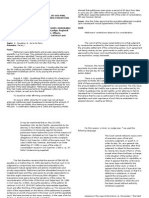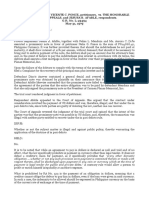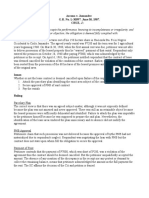Citizens Surety v. CA
Citizens Surety v. CA
Uploaded by
Ken ChaseMasterCopyright:
Available Formats
Citizens Surety v. CA
Citizens Surety v. CA
Uploaded by
Ken ChaseMasterOriginal Description:
Copyright
Available Formats
Share this document
Did you find this document useful?
Is this content inappropriate?
Copyright:
Available Formats
Citizens Surety v. CA
Citizens Surety v. CA
Uploaded by
Ken ChaseMasterCopyright:
Available Formats
CASE 85
Citizens Surety v. CA, GR L-48958, June 28, 1988 [Per J. Gutierrez, Jr., Third Division]
FACTS:
On December 4 1959 - Citizen’s Surety issued 2 surety bonds as guarantee for Principal Pascual Perez Enterprises in its
obligation for a Contract of Sale entered into with Singer Sewing Machine Co. Pascual Perez and his attorney in fact (wife)
executed the indemnity agreements obligating himself and the Enterprises to indemnify the petitioner jointly and severally.
Pascual Perez also placed a collateral security a stock of lumber with a total value of P400,000.00 through a deed of assignment
on same day. Then, Pascual Perez also executed a second real estate mortgage in favor of Citizens Surety. Pascual Perez
Enterprises failed to comply with the obligation with Singer Sewing Machine Co. Citizens Surety paid for the total amount of the
surety bonds at P144,000.00. Except for partial payments in the total sum of P55,600.00 and notwithstanding several demands,
Pascual M. Perez Enterprises failed to reimburse Citizen’s Surety for the losses it sustained under the said surety bonds. Citizens
Surety filed a claim for sum of money against the estate of the Attorney in Fact and Wife of Pascual M. Perez. Perez
averred: that the bonds and indemnity agreements had been extinguished by the deed of assignment due to the CA’s judgment
which extinguished the obligation by virtue of execution of deed of assignment and release of second mortgage.
ISSUE:
WON the obligation under the surety bonds and indemnity agreements had been extinguished by reason of the execution of the
deed of assignment via dation of payment
.
Held:
No. there was no dation in payment. Perez averred : Obligation under the surety bonds and indemnity agreements had been
extinguished by reason of the execution of the deed of assignment via dation of payment.
Court ruled (with Citizen’s Surety): It is a rule that there is no room for construction thereof when words of a contract are plain
and readily understandable. However, this case is under the exceptions.
On its face, the document (Deed of Assignment) speaks of an assignment where there seems to be a complete conveyance of the
stocks of lumber to Citizen’s surety, as assignee. However, in the light of the circumstances obtaining at the time of the execution
of said deed of assignment, Court cannot regard the transaction as an absolute conveyance
Respondent court CA stated that "by virtue of the execution of deed of assignment, ownership of lumber materials had been
transferred from Perez to Citizen's Surety, and this amounted to dation in payment whereby Perez is considered to have alienated
his property in favor of the Citizen's Surety in satisfaction of a monetary debt (Article 1245). Perez's obligation therefore, under
the surety bonds is extinguished upon the execution of the deed of assignment." Court ruled that his is not sustained by the
records.
1. The transaction cannot be dation in payment because the obligation on the part of Citizens Surety to pay Singer Sewing
Machine had not yet arisen. There was nothing extinguished on that date, hence there is no dation in payment.
2. The deed of assignment cannot be regarded as an absolute conveyance whereby the obligation under the surety bonds was
automatically extinguished. The subsequent acts of Perez bolster the fact that the deed of assignment was intended merely as a
security for the issuance of the two bonds.
o Partial payments amounting to P55,600 were made after the execution of the deed of assignment to satisfy the obligation
under the two surety bonds.
o Since later payments were made to pay the indebtedness, it follows that no debt was extinguished upon the execution of the
deed of assignment.
o Moreover, a second real estate mortgage was executed on April 12, 1960 and eventually cancelled only on May 15, 1962. If
indeed the deed of assignment extinguished the obligation, there was no reason for a second mortgage to still have to be
executed.
o We agree with the two dissenting opinions in the Court of Appeals that the only conceivable reason for the execution of still
another mortgage on April 12, 1960 was because the obligation under the indemnity bonds still existed. It was not yet
extinguished when the deed of assignment was executed on December 4, 1959.
o The deed of assignment was therefore intended merely as another collateral security for the issuance of the two surety
bonds.
You might also like
- Oblicon Digest (2) 45 C&C Corporation-V-Menor 1P No Duty To Accept Lowest BidderDocument1 pageOblicon Digest (2) 45 C&C Corporation-V-Menor 1P No Duty To Accept Lowest BidderJomar Teneza100% (1)
- Act 457 Methodist Church in Malaysia Act 1955Document8 pagesAct 457 Methodist Church in Malaysia Act 1955Adam Haida & CoNo ratings yet
- Citizens Surety Vs CADocument2 pagesCitizens Surety Vs CAWayne Libao ForbesNo ratings yet
- 84 Solinap V Del RosarioDocument1 page84 Solinap V Del Rosarioluigimanzanares100% (1)
- Portugal Vs IACDocument2 pagesPortugal Vs IACUPM ALSNo ratings yet
- Dar vs. GoducoDocument3 pagesDar vs. GoducoWayne Libao ForbesNo ratings yet
- 80 Gan-Tion V CADocument1 page80 Gan-Tion V CAluigimanzanaresNo ratings yet
- Citizens Surety v. CA, GR L-48958, June 28, 1988 (Reviewed)Document1 pageCitizens Surety v. CA, GR L-48958, June 28, 1988 (Reviewed)Steve UyNo ratings yet
- 75 Citizens Surety V CADocument2 pages75 Citizens Surety V CAluigimanzanaresNo ratings yet
- 88 Mindanao Portland Cement V CADocument1 page88 Mindanao Portland Cement V CAluigimanzanaresNo ratings yet
- 77 Boysaw v. InterPhil PromotionsDocument4 pages77 Boysaw v. InterPhil PromotionsChachi SorianoNo ratings yet
- Tong Bro Co V IAC and Juliano and CompanyDocument1 pageTong Bro Co V IAC and Juliano and Companycamilla ann manaloNo ratings yet
- Balila Vs IACDocument3 pagesBalila Vs IACNath AntonioNo ratings yet
- Immaculata Vs NavarroDocument2 pagesImmaculata Vs NavarroLauriz Esquivel100% (1)
- 79.2 People v. FranklinDocument1 page79.2 People v. FranklinluigimanzanaresNo ratings yet
- Laguna vs. Manabat: FactsDocument2 pagesLaguna vs. Manabat: Factsrach casimNo ratings yet
- Sps Onnie Serrano and Amparo Herrera V CaguiatDocument2 pagesSps Onnie Serrano and Amparo Herrera V CaguiatJohn YeungNo ratings yet
- 73 Del Rosario V ShellDocument1 page73 Del Rosario V ShellluigimanzanaresNo ratings yet
- Solinap v. Del RosarioDocument2 pagesSolinap v. Del RosarioNico Delos Trinos100% (1)
- Immaculata V Navarro, GR L-42230, November 26, 1986 (Per J. Paras, Second Division)Document2 pagesImmaculata V Navarro, GR L-42230, November 26, 1986 (Per J. Paras, Second Division)Steve UyNo ratings yet
- Ponce vs. CA - (GR No L-49494)Document2 pagesPonce vs. CA - (GR No L-49494)Katharina Canta100% (1)
- Velasco v. CA and GSISDocument1 pageVelasco v. CA and GSISmelaniem_1100% (1)
- 28 Bachrach Motor V EspirituDocument1 page28 Bachrach Motor V Espirituluigimanzanares100% (1)
- Sanchez Vs Rigos G R No L 25494 45 SCRADocument2 pagesSanchez Vs Rigos G R No L 25494 45 SCRAKate EvangelistaNo ratings yet
- 38 - Castillo v. Security BankDocument2 pages38 - Castillo v. Security BankJcNo ratings yet
- Del Rosario v. ShellDocument2 pagesDel Rosario v. ShellJoshua ReyesNo ratings yet
- Ponce vs. CADocument1 pagePonce vs. CACeline GarciaNo ratings yet
- Telengtan Brothers & Sons, Inc., Vs United States Lines, IncDocument2 pagesTelengtan Brothers & Sons, Inc., Vs United States Lines, IncIan CabanaNo ratings yet
- SOTTO, vs. MIJARES, ET AL.Document2 pagesSOTTO, vs. MIJARES, ET AL.Jillian Asdala50% (2)
- Azcona v. JamandreDocument1 pageAzcona v. JamandreAnsai Claudine Calugan100% (1)
- Lao Sok v. Sabaysabay Forms of ContractsDocument1 pageLao Sok v. Sabaysabay Forms of ContractsHanna Besa100% (1)
- Arsenal v. IacDocument2 pagesArsenal v. IacEmmanuel Alejandro YrreverreIii100% (1)
- Soco v. MilitanteDocument2 pagesSoco v. MilitanteMark Evan GarciaNo ratings yet
- 27 PNB V Independent PlantersDocument1 page27 PNB V Independent PlantersluigimanzanaresNo ratings yet
- HSBC Vs Sps. Bienvenido and BroquezaDocument2 pagesHSBC Vs Sps. Bienvenido and BroquezaShauna HerreraNo ratings yet
- Bachrach Motor Co vs. Espiritu 52 Phil 346Document4 pagesBachrach Motor Co vs. Espiritu 52 Phil 346Celine GarciaNo ratings yet
- IV 2 Pineda Vs de La RamaDocument1 pageIV 2 Pineda Vs de La RamaValora France Miral AranasNo ratings yet
- Balila Vs IACDocument2 pagesBalila Vs IACAleezah Gertrude RegadoNo ratings yet
- Del Rosario V ShellDocument2 pagesDel Rosario V Shellaratanjalaine0% (1)
- Pilipinas Bank v. IACDocument1 pagePilipinas Bank v. IACAiress Canoy Casimero100% (1)
- Pentacapital Investment Corporation vs. Makilito B. MahinayDocument1 pagePentacapital Investment Corporation vs. Makilito B. MahinayLouie Marrero DadatNo ratings yet
- 55-De Guzman Vs CADocument1 page55-De Guzman Vs CARewel Jr. Medico100% (1)
- Laguna Tayabas Bus Co vs. Manabat - DigestDocument1 pageLaguna Tayabas Bus Co vs. Manabat - DigestNina S100% (1)
- 95 Laguna v. ManabatDocument1 page95 Laguna v. ManabatJoshua Alexander CalaguasNo ratings yet
- 115 NPC V DayritDocument1 page115 NPC V DayritFrancesca Isabel MontenegroNo ratings yet
- People VS Supat Ra 9165 Case DigestDocument2 pagesPeople VS Supat Ra 9165 Case DigestUrsula MedinaNo ratings yet
- Javier v. Vda de CruzDocument2 pagesJavier v. Vda de CruzMacy Ybanez100% (2)
- Case Digest Ong Yiu vs. PalDocument4 pagesCase Digest Ong Yiu vs. Palkateangel ellesoNo ratings yet
- Rescissible Contracts - Cabaliw V Sadorra (1975)Document1 pageRescissible Contracts - Cabaliw V Sadorra (1975)Lino MomonganNo ratings yet
- Void Contracts DigestDocument4 pagesVoid Contracts DigestZeke Garcia100% (1)
- Javier V. Vda. de Cruz, GR L-25891, November 29, 1977 (Per J. Fernandez, First Division)Document2 pagesJavier V. Vda. de Cruz, GR L-25891, November 29, 1977 (Per J. Fernandez, First Division)Steve UyNo ratings yet
- Sps. Fortunato Santos and Rosalinda Santos vs. CADocument14 pagesSps. Fortunato Santos and Rosalinda Santos vs. CAShela L LobasNo ratings yet
- PNB v. Ong Acero Feb. 27, 1987 Narvasa, J. Short VersionDocument2 pagesPNB v. Ong Acero Feb. 27, 1987 Narvasa, J. Short VersionGabe RuaroNo ratings yet
- Immaculata v. NavarroDocument1 pageImmaculata v. NavarroIvan BernardNo ratings yet
- Menil v. CADocument2 pagesMenil v. CAAiress Canoy CasimeroNo ratings yet
- Case Digest (LIM YHI LUYA Versus COURT OF APPEALS GR NO. L40258 September 11,1980)Document1 pageCase Digest (LIM YHI LUYA Versus COURT OF APPEALS GR NO. L40258 September 11,1980)Dyan XyleneNo ratings yet
- 118 Tong Bros. v. IACDocument2 pages118 Tong Bros. v. IACCarlos Poblador100% (1)
- Banco Filipino Vs NavarroDocument3 pagesBanco Filipino Vs NavarroRo Che100% (2)
- Garcia 417 Scra 292Document12 pagesGarcia 417 Scra 292Mp CasNo ratings yet
- G. Modes of Extinguishment of Obligations Case Digests 2Document107 pagesG. Modes of Extinguishment of Obligations Case Digests 2Reyzen Paul Unite MendiolaNo ratings yet
- California Supreme Court Petition: S173448 – Denied Without OpinionFrom EverandCalifornia Supreme Court Petition: S173448 – Denied Without OpinionRating: 4 out of 5 stars4/5 (1)
- Mapa vs. Insular Government, G.R. No. L-3793, February 19, 1908Document5 pagesMapa vs. Insular Government, G.R. No. L-3793, February 19, 1908Ken ChaseMasterNo ratings yet
- de Aldecoa Vs Insular Government (G.R. No. 3894. March 12, 1909)Document4 pagesde Aldecoa Vs Insular Government (G.R. No. 3894. March 12, 1909)Ken ChaseMasterNo ratings yet
- Supreme Court: Vicente J. Francisco For Appellants. Feria and La O For AppelleeDocument5 pagesSupreme Court: Vicente J. Francisco For Appellants. Feria and La O For AppelleeKen ChaseMasterNo ratings yet
- City-of-Manila-vs.-TeoticoDocument8 pagesCity-of-Manila-vs.-TeoticoKen ChaseMasterNo ratings yet
- Supreme Court: Alcuaz & Eiguren For Appellant. Araneta & Araneta For AppelleesDocument5 pagesSupreme Court: Alcuaz & Eiguren For Appellant. Araneta & Araneta For AppelleesKen ChaseMasterNo ratings yet
- Commissioner of Internal Revenue, Petitioner, Philippine Airlines, Inc., RespondentDocument36 pagesCommissioner of Internal Revenue, Petitioner, Philippine Airlines, Inc., RespondentKen ChaseMasterNo ratings yet
- Imperial Insurance V RoseteDocument4 pagesImperial Insurance V RoseteKen ChaseMasterNo ratings yet
- Yusi V MoralesDocument4 pagesYusi V MoralesKen ChaseMasterNo ratings yet
- Prasnick V RepublicDocument3 pagesPrasnick V RepublicKen ChaseMasterNo ratings yet
- Pe V RepublicDocument2 pagesPe V RepublicKen ChaseMasterNo ratings yet
- Heirs of Nunez SR v. Heirs of VillanozaDocument35 pagesHeirs of Nunez SR v. Heirs of VillanozaKen ChaseMasterNo ratings yet
- Cabanlig vs. Sandiganbayan, 464 SCRA 324, July 28, 2005Document20 pagesCabanlig vs. Sandiganbayan, 464 SCRA 324, July 28, 2005Ken ChaseMasterNo ratings yet
- Uss 08-02-2022Document14 pagesUss 08-02-2022Ankitha Rao RNo ratings yet
- Clemente v. CA & JalandoonDocument3 pagesClemente v. CA & JalandoonJcNo ratings yet
- 01 Caballes V Ca (531 Scra 691)Document5 pages01 Caballes V Ca (531 Scra 691)earl0917No ratings yet
- Case Digest - Sps Ponce V AldaneseDocument4 pagesCase Digest - Sps Ponce V AldanesemarvinNo ratings yet
- Owner (Lot-1135-A) (Lot-53-A) (Lot-1444-A)Document4 pagesOwner (Lot-1135-A) (Lot-53-A) (Lot-1444-A)Earl Mercado CalingacionNo ratings yet
- Gabil Vs PerezDocument4 pagesGabil Vs PerezNimpa PichayNo ratings yet
- Condominium Concept and PlanningDocument42 pagesCondominium Concept and PlanningKezziah Josh Arcega100% (2)
- SALES - Bar Q & ADocument10 pagesSALES - Bar Q & AMajorie ArimadoNo ratings yet
- Offer To Purchase Tierra VerdeDocument2 pagesOffer To Purchase Tierra Verdeshrine obenietaNo ratings yet
- Legal Opinion 1. Sub: Sub: Legal Opinion in Respect of Residential Accommodation/ FlatDocument10 pagesLegal Opinion 1. Sub: Sub: Legal Opinion in Respect of Residential Accommodation/ FlatMuskan ShaikhNo ratings yet
- ICSE - LAND CertificateDocument2 pagesICSE - LAND CertificateDhirendra Mishra100% (1)
- CUPINO AND COLOCADO vs. PACIFIC REHOUSE CORPORATIONDocument3 pagesCUPINO AND COLOCADO vs. PACIFIC REHOUSE CORPORATIONMac SorianoNo ratings yet
- Spiritual Side of Wrongful ForeclosureDocument5 pagesSpiritual Side of Wrongful ForeclosureForeclosure FraudNo ratings yet
- CRLMP 482 Shanti Bai Chittorgarh (FIR Quashing)Document24 pagesCRLMP 482 Shanti Bai Chittorgarh (FIR Quashing)Lokesh RajNo ratings yet
- Variation Deed (To Amend An Initial Agreement) - Template SampleDocument5 pagesVariation Deed (To Amend An Initial Agreement) - Template SampleLegal ZebraNo ratings yet
- Taneo vs. CADocument13 pagesTaneo vs. CAAji AmanNo ratings yet
- International Law, Admiralty, Maritime Process, Form #09.061Document228 pagesInternational Law, Admiralty, Maritime Process, Form #09.061Sovereignty Education and Defense Ministry (SEDM)100% (2)
- Digest By: Shimi Fortuna Balatbat Vs CADocument2 pagesDigest By: Shimi Fortuna Balatbat Vs CAShimi FortunaNo ratings yet
- Cma (DR.) Adukia'S Handbook On Drafting, Conveyancing,: Stamping and RegistrationDocument106 pagesCma (DR.) Adukia'S Handbook On Drafting, Conveyancing,: Stamping and RegistrationSankalp SrivastavaNo ratings yet
- Case Digest ATP (58-64)Document7 pagesCase Digest ATP (58-64)Domie AbataNo ratings yet
- Sales Case DigestDocument3 pagesSales Case DigestSaji JimenoNo ratings yet
- The Doctrine of Lost Modern GrantDocument24 pagesThe Doctrine of Lost Modern GrantJohn O'BrienNo ratings yet
- Reservation Agreement: Project Name: TypeDocument5 pagesReservation Agreement: Project Name: TypeMia NungaNo ratings yet
- Evidence Affidavit Brajesh KumarDocument6 pagesEvidence Affidavit Brajesh KumarAKHiiLESH BhamaNo ratings yet
- Civil Code Philippines Obligation ContraDocument26 pagesCivil Code Philippines Obligation ContraZarah JeanineNo ratings yet
- Jose S. Ramiscal, JR., Petitioner, vs. People of The Philippines, Respondent.Document26 pagesJose S. Ramiscal, JR., Petitioner, vs. People of The Philippines, Respondent.Farahleen Pearl PalacNo ratings yet
- Deed of Release - 16 Feb 2017 (2467080v2) PDFDocument14 pagesDeed of Release - 16 Feb 2017 (2467080v2) PDFAnonymous JCsrLu5DdANo ratings yet
- SPA JL SAYANG Paranaque (Santos November, 2022)Document4 pagesSPA JL SAYANG Paranaque (Santos November, 2022)Areez Nur IjinNo ratings yet
- Alejandro Vs - GeraldezDocument18 pagesAlejandro Vs - GeraldezRon Jacob AlmaizNo ratings yet





































































































